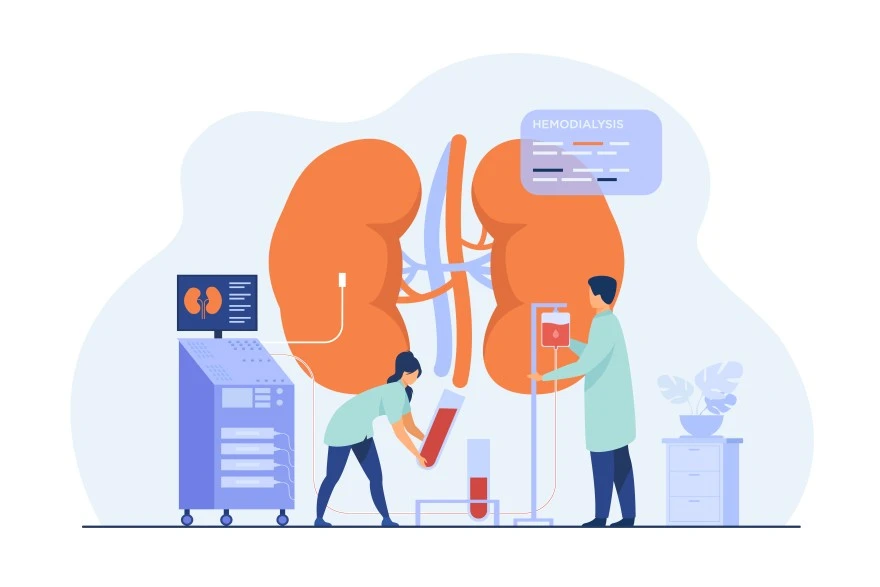Preventive Healthcare
A Comprehensive Guide to Pancreas Tests: Its Types, Purposes and What to Expect

Table of Contents
- What Are Pancreas Tests?
- What Are the Different Types of Pancreas Tests?
- What Can I Expect During My Pancreas Test?
- What Are Pancreas Blood Tests Used for?
- When Would a Pancreas Blood Test be Needed?
- What Are the Symptoms of Pancreatitis?
- What Should I Expect During the Pancreas Blood Test?
- What Do Abnormal Pancreas Blood Test Results Mean?
- How Is Chronic Pancreatitis Treated?
- Conclusion
A pancreas test is effective in finding out the pancreatic issue and getting a quick treatment from the doctor. It is a blood test to identify the issue in your organ, named the pancreas. The blood test helps doctors identify the disease and its underlying condition and prescribe the right cure for it. Your pancreas enzyme value is detected in the blood test. Apart from blood tests, imaging tests are a great way of spotting abnormalities within the pancreas.
What Are Pancreas Tests?
A pancreas test is helpful for doctors to know the health of your pancreas and come up with a treatment for the issue. Your pancreas is a crucial organ of your body. They are an important part of your digestive system.
The pancreas is the organ that helps break the protein and fats in your body and allow them to be absorbed into the body. The food also has a lot of nutrients, and the pancreas plays an important role in their absorption. The organ is also responsible for releasing hormones that control the level of stomach acid. Besides, it helps regulate your blood sugar level.
If you have a low-functioning pancreas, you can face problems digesting food. Over time, this condition can worsen if you do not treat it in the early stages. In addition, your other organs also suffer due to the problem in your pancreas.
What Are the Different Types of Pancreas Tests?
Doctors conduct various types of pancreas tests to identify the underlying problem. The test is conducted on your blood or stool. It helps identify a certain chemical in any of your blood or stool samples. The Pancreatitis blood test results help your healthcare provider identify if the pancreas is working properly.
Among the various types of pancreas profile tests, one kind is imaging tests. It helps see your pancreas and look for symptoms of pancreatitis. These tests also assist in knowing if you have pancreatic cancer.
-
Pancreas function test: The test helps you know about the functioning of your pancreas. It also helps your healthcare provider know if the chemical is produced in the right proportion by your pancreas. Furthermore, the doctors also know your blood enzyme level. You can also submit your stool sample to know the level of enzymes. These tests are crucial to measure the amount of chemicals released by your pancreas. Based on your health condition and symptoms, the professional doctor will recommend various kinds of tests. Abnormal results show that you are having pancreatic disease.
-
Imaging test: This test helps the doctor to know the appropriate condition of the pancreas. If there is any inflammation or swelling in your pancreas, you might have pancreatic cysts or stones. It can also be a tumour. Images can also show if you have had pancreatic disease for a long time. For instance, there may be signs of scarring. The various tests a doctor might conduct are CT scanning, MRI and ultrasounds.
If you have pancreatic cancer, the doctor is more likely to conduct an imaging test. In case the healthcare provider notices symptoms of cancer, they might ask you to get a biopsy. In a biopsy, your cell sample is examined under a microscope, and the results are confirmed.
There are still a lot of studies conducted by researchers to come up with a blood test to identify pancreatic cancer. Such blood tests will help the doctor identify if the patient is at risk due to genetic factors. Some researchers have not yet concluded that pancreatic cancer can be inherited from genes and family members.
What Can I Expect During My Pancreas Test?
The pancreas test is normally simple. However, there might be a few tests, which can be uncomfortable for the patient. Such tests are called invasive tests. In an invasive test, the doctor or healthcare provider looks into your body with an electronic instrument.
Therefore, doctors prefer noninvasive tests. Such tests are less or not painful at all. However, if the situation demands taking intensive measures, doctors might choose invasive procedures. Be it any test, it is important to know the underlying problem and its causes at all costs.
What Are Pancreas Blood Tests Used for?
Blood tests for pancreatitis are noninvasive tests. It means they are not painful at all. The doctor drags blood from your vein and puts it into testing. They send it to a pathologist and get the sample test done soon. It is the first type of test recommended by doctors to check the functioning of your pancreas.
Moreover, if you have fresh symptoms of pancreas disease, blood tests are the best option to go for. Doctors know the enzyme level in your pancreas. They examine if your pancreatic enzymes are at a normal or higher level. If you have a high level of enzymes, it means you have pancreatitis. Your healthcare provider will recommend medications and carry on further treatment for this condition.
When Would a Pancreas Blood Test be Needed?
Your doctor would recommend you a pancreas profile test if you have the symptoms of pancreatic disorder. It can be pancreatitis or pancreatic cancer. The blood test or pancreas test helps the doctor determine the level of pancreatic enzymes in your blood.
Your healthcare provider may recommend you to take a blood, stool or imaging test.
What Are the Symptoms of Pancreatitis?
The doctor recommends a pancreas test after detecting symptoms of pancreatitis. Now, the common symptoms of this condition are redness and inflammation of the pancreas. It usually happens when your digestive enzyme damages the pancreas.
Your pancreas is a gland that helps send digestive enzymes to your intestine and break food into nutrients. It is also responsible for producing hormones like glucagon and insulin. These hormones are responsible for controlling your blood sugar level.
Here are a few symptoms of both acute and chronic pancreatitis:
-
Symptoms of Acute pancreatitis
-
Inflammation
-
Pain for a short duration
-
Can be deadly in some cases
-
Symptoms of Chronic pancreatitis
-
Inflammation for a long time, which comes once every hour
-
Permanently damages your pancreas
-
Scars in your pancreatic tissues
-
The pancreas stops making digestive enzymes and insulin
Other symptoms of pancreatitis include the following:
-
Severe stomach pain and chest pain
-
Feeling nauseous
-
Vomiting
-
Speed heartbeat
-
High fever
-
Swelling in the upper belly
-
Fluid buildup
-
Low blood pressure
-
Yellow skin and eyes
These symptoms might be similar to other health conditions. However, visit your healthcare provider every time you see any such symptoms.
What Should I Expect During the Pancreas Blood Test?
It will be a simple procedure of drawing a blood sample from your vein. The pathologist will clean your skin around the arm and draw a small blood sample in a tube. They will immediately wrap a cotton pad around it. You might feel numb or sore in a particular area for some time. However, you will feel normal in a few minutes.
What Do Abnormal Pancreas Blood Test Results Mean?
Both lipase and amylase levels in your blood help you know the condition of your pancreas. High levels of amylase and lipase in your pancreas test signify that you have pancreatitis or pancreatic disorder. When amylase and lipase are three times higher than their normal level, it shows you have acute pancreatitis.
The Pancreatitis blood test levels show your blood enzyme level. These enzymes can be either amylase or lipase. The healthcare provider will contact you for further treatment or surgery based on the results.
The Pancreas blood test normal values are 10 to 140 U/L in adults less than the age of 60 years. For 60 years and above, the normal range is 24 to 151 U/L. The higher the level of lipase, the greater your chances of having acute pancreatitis. Also, if the enzyme level is 3 to 10 times more than the normal level, you might have pancreatitis or pancreatic cancer.
Consult your doctor for better diagnosis and treatment in case of any issues detected in the pancreas test.
How Is Chronic Pancreatitis Treated?
Your healthcare provider will ask you to avoid the consumption of alcohol and other substances. He might prescribe you pain relief medications. If you have chronic pancreatitis, your body will have difficulty absorbing nutrients. Hence, your doctor might also recommend vitamins to help in digestion, along with the blood test for pancreatitis.
The healthcare provider may suggest immediate Pancreatitis surgery to transplant the pancreas. Doctors are still unsure about the cause of severe pain during chronic pancreatitis. Many doctors and researchers suggest that inflamed nerves and their pain signalling system can be the reason behind the increase in pain frequency.
Conclusion
Pancreatitis is a deadly disease. It can also harm your other organs with time. Therefore, it is essential to get a pancreas blood test done as soon as possible. Go to the best diagnostic centre to get a blood test.
Metropolis Labs is the best pathology lab in India. It is renowned for its best testing and advanced equipment. Moreover, Metropolis has its branches in countries like South Asia, Africa and the Middle East. Around 200+ professionals are carrying out effective diagnoses at Metropolis.
You get your pancreas test reports within 24 hours. The best part is they conduct all kinds of testing. From blood, stool and urine to imaging tests, everything is available at Metropolis.


























